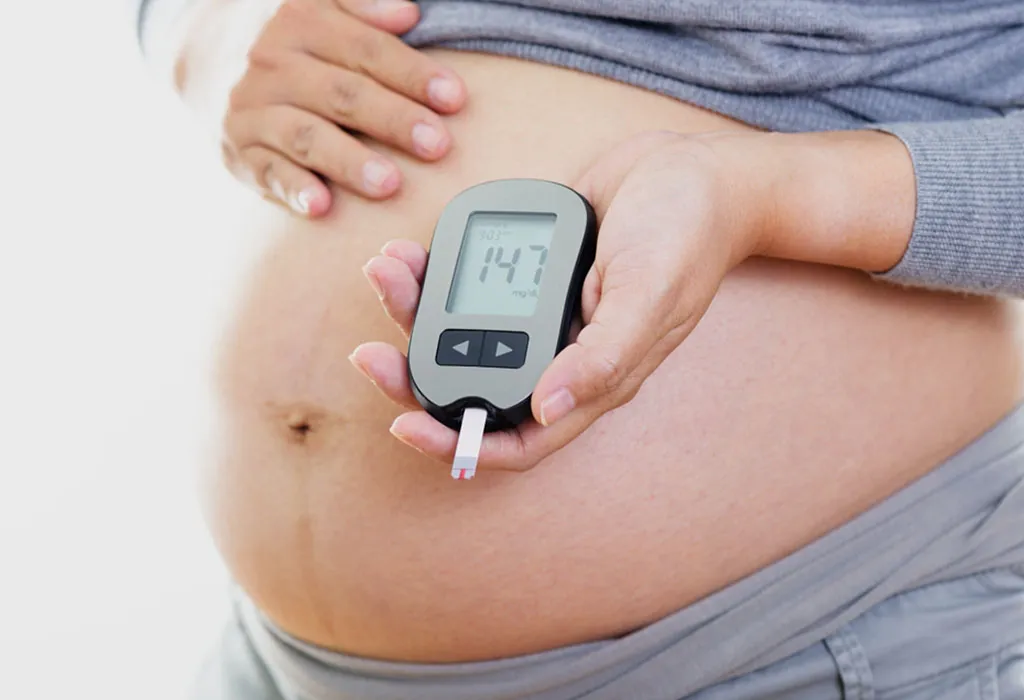Glucose Challenge Test (GCT) & Glucose Tolerance Test (GTT) in Pregnancy

Gestational diabetes during pregnancy is common. This condition occurs when the pancreas isn’t able to produce enough insulin to meet the increased requirements of both the mother and the developing baby. While it typically normalizes once the baby is born, early diagnosis and proper management are crucial to prevent any potentially harmful effects on both the mother and the foetus. Regular prenatal check-ups, monitoring blood sugar levels, and maintaining a healthy diet can significantly reduce the risks associated with gestational diabetes, ensuring a safer pregnancy and a healthier outcome for both mother and child. Diagnostic tests such as the glucose challenge test & the glucose tolerance test in pregnancy are essential for early detection and effective management of this condition.
What Is Glucose Screening Test When Pregnant?
A glucose test during pregnancy is a common test done on pregnant women to check the blood glucose level to detect the presence or absence of gestational diabetes. There are two types of glucose screening tests: the Glucose Challenge Test and the Glucose Tolerance Test while pregnant. These tests are conducted between the 24th week and the 28th week.
Who Needs to Take the Glucose Challenge Test?
If a routine urine test displays high glucose levels, a glucose challenge test in pregnancy is done soon after. In some cases, it is even done before the 24th week. Women, especially those with high BMI (Body Mass Index) or those who have a family history of diabetes, need to take the glucose challenge test. Older pregnant women, post 35, too, should take the test.
Why Do You Need to Take GCT During Pregnancy?
GCT, or the Glucose Challenge Test, is conducted to find if the pregnant woman has gestational diabetes or not. Gestational diabetes in pregnant women can lead to several pregnancy complications, such as excess foetal growth or a condition known as preeclampsia, which is characterised by high blood pressure and the presence of protein in the urine. It can lead to birth injuries, and in some cases, a caesarean section delivery will be needed. Hence, the test is of utmost importance.
How Is the Glucose Challenge Test Done?
The glucose challenge test, or GCT, is the process of measuring the body’s reaction to sugar or glucose. The test involves consuming a sugary drink, which may be a glucose drink. It is a non-fasting test, which means you do not need to fast before the tests. You rest for an hour, and then a blood test is done to evaluate the blood sugar levels. The results may show low, normal or high sugar levels. The high levels mean the person is suffering from gestational diabetes. In that case, the glucose tolerance test is done to confirm the diagnosis.
How Is the Test Result Interpreted?
Blood glucose levels are measured either in mg/dl or milligrams per decilitre or mmol/l or millimoles per litre. The purpose of the glucose challenge test is to determine the sugar levels in the blood. The test results are evaluated based on the deviation from normal levels. The normal sugar level in a person is 140 mg/dL or 7.8mmol/L. Though this normal range is what is accepted everywhere, in some labs, a value which is a little lower than this range is also considered normal. Anything above the normal GCT test range in pregnancy confirms gestational diabetes.
What Is GTT Test During Pregnancy?
Glucose Tolerance Test or GTT is also known as OGTT for pregnancy or the Oral Glucose Tolerance Test It is done to find out how the body responds to sugar levels. This test is done to diagnose the presence of gestational diabetes. In some cases, the diagnosis of Type 2 diabetes can also be done with GTT.
How to Prepare for Glucose Tolerance Test?
You can have your usual diet until a day before the test. Here’s how to prepare for glucose tolerance test pregnancy:
- This is a fasting test, and you will be required to fast for eight hours before it.
- You will also need to drink an adequate amount of water before the test.
- As a urine sample is asked as a part of the test, one needs to avoid a bathroom visit a few hours before the test.
- Some medications may influence the test results, so talk to your doctor about any medicines you may be taking
- You can carry some things like a book to keep yourself occupied as you may have to wait for an hour or two for the test
- You can carry some snacks with you so that you can have it once the tests are do
- Stay cheerful and happy. Stress levels too have a role in raising blood sugar levels.
How Is the Glucose Tolerance Test in Pregnancy Done?
There will be some variations in the way the test is done as per the lab or the doctor’s advice. The pregnancy blood glucose test or GTT is a fasting test. So, you will be required to fast or not consume any solid food for around 8 hours before the test. This test is usually done in the morning so you may be asked to have a late-night meal to ensure a gap of 8 hours before the test in the morning. First, a fasting blood sample test is done. After the blood is drawn, you will be given a glucose drink or any other sugar drink. After an hour, the blood sample is again taken and this procedure may be repeated at least twice again.
How Is the Test Result for GTT Interpreted?
The test results for GTT are interpreted on three levels: pre-diabetes, diabetes and gestational diabetes. The case of Type 2 diabetes is not evaluated at this point but the doctor may ask you to take the test again some other day. The unit of blood glucose for making the calculations are in mg/dL or milligrams/decilitre.
Below is a chart showing what the glucose tolerance test results mean:
| Blood Sugar Range | |
| Normal Blood Sugar Range | 60-100 mg/dL |
| Pre-Diabetic Range | 101-126 mg/dL |
| Diabetic Range | More than 126 mg/dL |
Causes of High Glucose Levels
Here are some reasons why a mother-to-be may have high glucose levels
- Generally, a rise in sugar level occurs during pregnancy due to certain hormones produced by the placenta. In most cases, this does not cause a problem because the pancreas releases insulin that can handle the increased sugar levels.
- Gestational diabetes occurs when pancreas does not release the required insulin.
Causes of Low Glucose Level
Here are some reasons why a mother-to-be may have high glucose levels
- Low glucose level can be caused due to over-exertion or inadequate diet.
- It can also result if one eats late often or if skipping meals become a habit.
- Those who exercise more are also prone to having low sugar levels.
- Diabetic pregnant women too can suffer from low glucose level if the insulin taken is high.
Risk or Side Effects of OGTT in Pregnancy
Here are some you may watch out for:
- Some women may experience drastic decrease of sugar levels during the Oral Glucose Tolerance Test. In such a case, they may feel weak, anxious or uncomfortable.
- The area on the skin from where the blood is drawn may develop infections if the technician hasn’t sterilised it.
- In rare cases, excess bleeding can occur from the region but only in rarest of rare cases.
- Bruises or swelling can also occur in the area.
- In extreme and very rare cases, there can be excessive bleeding or blood built up under the skin.
What If Your Results Are Abnormal?
Abnormal results are perceived when the results for the test differ each time your blood is drawn. If only one of the abnormal readings is above the normal range then your doctor may simply suggest a change in food habits. However, if more than one of the abnormal readings are above normal then it means that you are suffering from gestational diabetes.
How to Lower Your Blood Glucose Levels?
Here are some tips through which one can naturally lower their blood glucose:
- Exercising helps train the body to use blood sugar efficiently
- Avoid carbohydrates as they could interfere with the insulin function of the body
- Adding soluble fibres to your diet helps in naturally reducing blood sugar levels. This is because they help slow down the absorption of sugar in the body.
- Drinking a good amount of water helps the kidney remove excess sugar in the blood.
- Following a Diet Plan for Gestational Diabetes could be of great help.
FAQs
1. Can the timing of the Glucose Challenge Test (GCT) affect the results?
Yes, the timing of the GCT can influence the results. It is generally recommended to take the test between 24 and 28 weeks of pregnancy when the placental hormones that affect insulin resistance are at higher levels. Taking the test too early or too late can sometimes yield inaccurate results, either missing a diagnosis or giving a false positive.
Taking the Glucose tolerance test (GTT) and the Glucose Challenge test (GCT) in pregnancy does not necessarily mean that you have diabetes. It is always a good idea to keep a check on your glucose levels during pregnancy and get yourself treated if you show any signs of Gestational diabetes during pregnancy.
References/Resources:
1. Oral Glucose Tolerance Test During Pregnancy; Cleveland Clinic; https://my.clevelandclinic.org/health/diagnostics/9696-glucose-test-pregnancy
2. About Gestational Diabetes; CDC Diabetes; https://www.cdc.gov/diabetes/about/gestational-diabetes.html
3. Dolatkhah,. N, Hajifaraji. M, Shakouri. S; Nutrition Therapy in Managing Pregnant Women With Gestational Diabetes Mellitus: A Literature Review (Journal of Family and Reproductive Health); National Library of Medicine; https://www.ncbi.nlm.nih.gov/pmc/articles/PMC6391302/; June 2018
4. Eyth. E, Basit. H, Swift. C; Glucose Tolerance Test; National Library of Medicine; https://www.ncbi.nlm.nih.gov/books/NBK532915/
5. FAQs: Gestational Diabetes; American College of Obstetricians and Gynecologists; https://www.acog.org/womens-health/faqs/gestational-diabetes
6. In brief: What do glucose tolerance tests involve? (InformedHealth.org); National Library of Medicine; https://www.ncbi.nlm.nih.gov/books/NBK279331/
7. Blood Glucose & A1C: Understanding Diabetes Diagnosis; American Diabetes Association; https://diabetes.org/about-diabetes/diagnosis
Also Read:
Blood Tests during Pregnancy
Triple Marker Test in Pregnancy
Pap Smear Test when Pregnant
Common Trimester-wise Tests during Pregnancy
CBC (Complete Blood Count) Blood Test in Pregnancy
Was This Article Helpful?
Parenting is a huge responsibility, for you as a caregiver, but also for us as a parenting content platform. We understand that and take our responsibility of creating credible content seriously. FirstCry Parenting articles are written and published only after extensive research using factually sound references to deliver quality content that is accurate, validated by experts, and completely reliable. To understand how we go about creating content that is credible, read our editorial policy here.





































